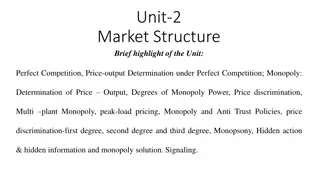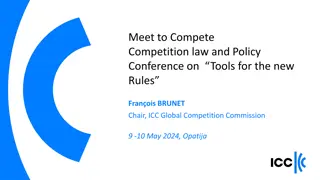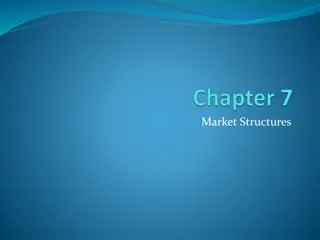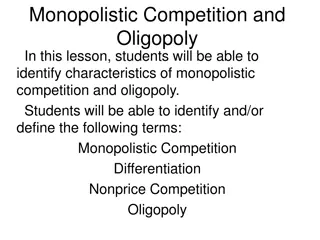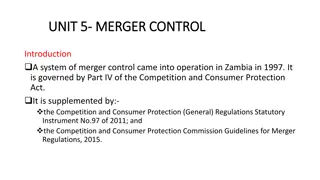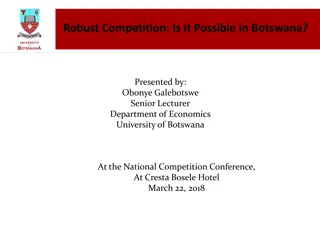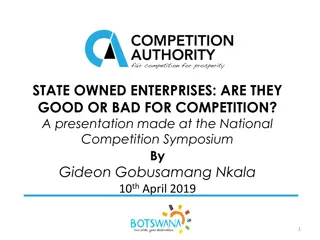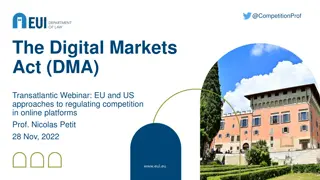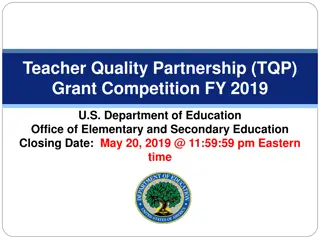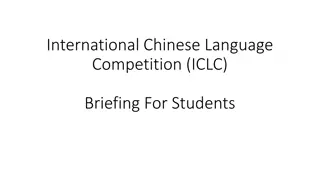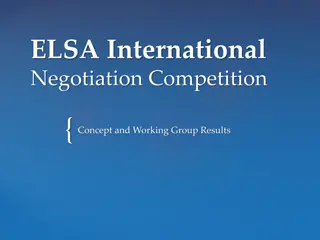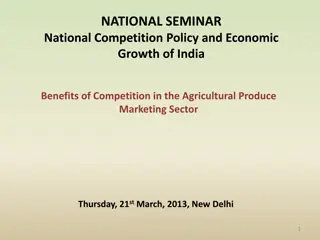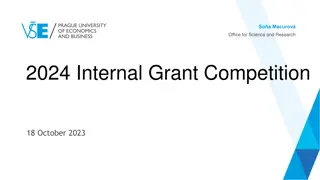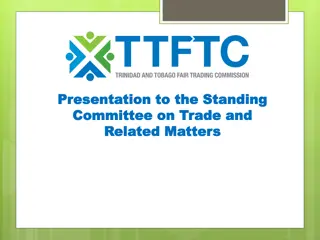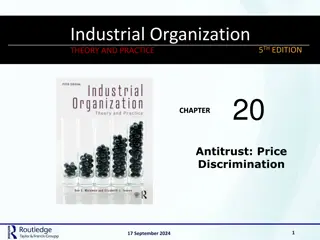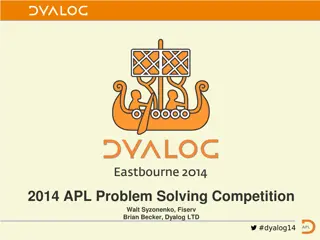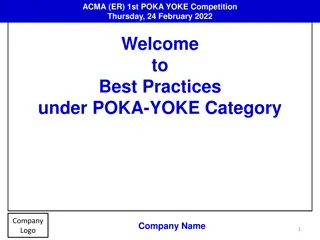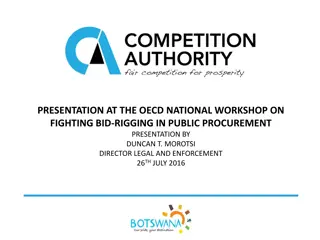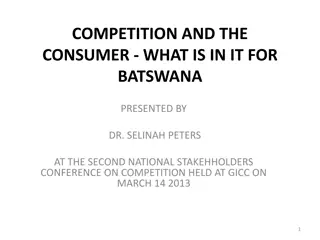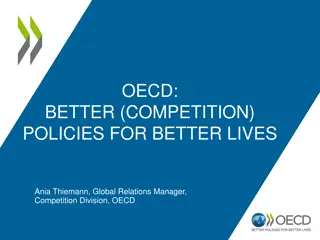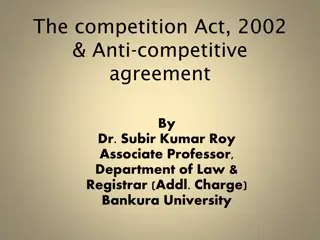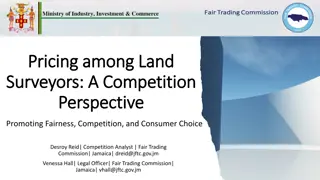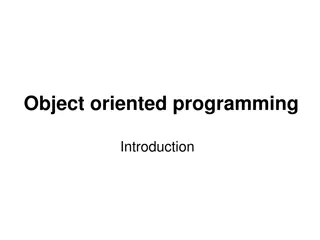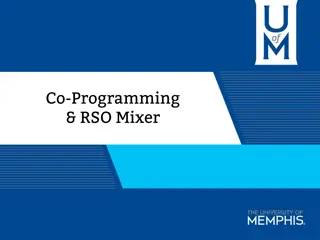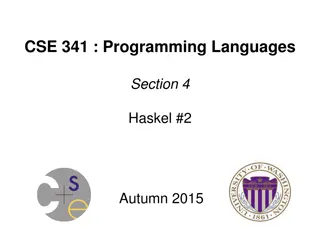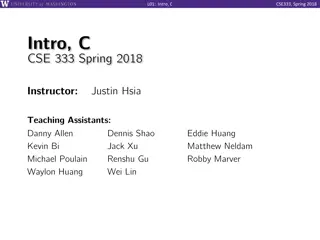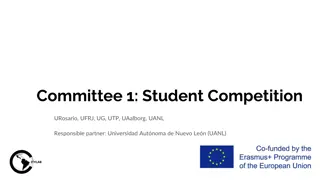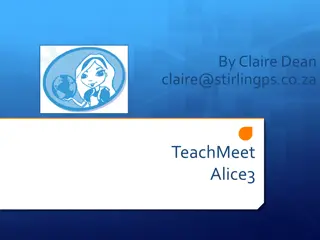PINCCER Competition Workshop FEB 2024
The article discusses the market concentration levels in smaller African economies like South Africa and Zambia, focusing on the impact on competition and consumer welfare. It highlights the Competition Amendment Act and the effectiveness of market inquiries in identifying and addressing competition
1 views • 14 slides
Market Structures and Competition Overview
Market structures in economics define the competitive characteristics of different markets. Perfect competition features many small firms producing identical products as price takers. Monopoly has one seller with significant market power, while monopolistic competition involves firms with some marke
4 views • 5 slides
ICC Global Competition Commission Conference 2024 Overview
The ICC Global Competition Commission is hosting the "Meet to Compete: Competition Law and Policy Conference" in Opatija on 9th-10th May 2024. The event aims to enhance harmonization and convergence among jurisdictions in competition policy areas, increase antitrust enforcement efficiency globally,
2 views • 13 slides
Market Structures and Competition
Exploring market structures such as perfect competition and monopolies, this content delves into the characteristics, implications, and types of different market environments. Perfect competition involves many buyers and sellers offering identical products, whereas monopolies arise from barriers pre
1 views • 31 slides
Decision Analysis and Operations Research in Management
This content delves into Management Decision Analysis and Operations Research techniques such as Linear Programming, Integer Linear Programming, Dynamic Programming, Nonlinear Programming, and Network Programming. It covers the phases of an Operations Research study, mathematical modeling for decisi
0 views • 36 slides
Monopolistic Competition and Oligopoly
Learn about the characteristics of monopolistic competition and oligopoly in the marketplace. Discover terms like Monopolistic Competition, Differentiation, Nonprice Competition, and Oligopoly. Understand how monopolistic competition involves similar but not identical products, while oligopoly is do
2 views • 15 slides
Module 2: PSEA and Safe Programming Training of Trainers (ToT) by CRS HRD
This Module 2 focuses on PSEA and Safe Programming, covering key sessions on understanding safe programming, identifying protection and SEA risks, and mitigating risks. It emphasizes the importance of safe programming in increasing safety, dignity, and access, with staff playing a crucial role. Part
3 views • 19 slides
Merger Control in Zambia: Regulations and Rationale
The system of merger control in Zambia, established in 1997 under the Competition and Consumer Protection Act, aims to regulate mergers to prevent market dominance and adverse effects on competition. Merger regulation objectives include safeguarding competition, preventing anti-competitive behavior,
0 views • 29 slides
Benefits of Robust Competition in Botswana: Insights and Recommendations
Explore the advantages of competition in Botswana as discussed at the National Competition Conference. Learn about the impact on prices, quality, choice, efficiency, innovation, economic growth, and more. Discover how fostering competition can benefit consumers, businesses, and the economy on a glob
1 views • 17 slides
State-Owned Enterprises and Competition: Impact and Implications
State-Owned Enterprises (SOEs) play a significant role in economies worldwide. This presentation by Gideon Gobusamang Nkala at the National Competition Symposium delves into the debate on whether SOEs are beneficial or detrimental to competition. Exploring the features, rationale, and competition po
5 views • 18 slides
Analysis of EU and US Approaches to Regulating Competition in Online Platforms
This webinar delves into the Digital Markets Act (DMA) and its implications for competition regulation in online platforms in both the EU and US. Prof. Nicolas Petit discusses the key principles and provisions of the DMA, shedding light on its impact on digital markets. The DMA targets core platform
0 views • 10 slides
Teacher Quality Partnership (TQP) Grant Competition - FY 2019 Overview
The Teacher Quality Partnership (TQP) Grant Competition for FY 2019 is organized by the U.S. Department of Education to enhance teacher quality through partnerships. The competition provides resources, guidelines, and application instructions for interested applicants. Important documents, checklist
3 views • 29 slides
International Chinese Language Competition (ICLC) Briefing for Students
Participate in the International Chinese Language Competition (ICLC) by logging in to the competition website, completing two competition parts, and submitting your answers for a chance to showcase your Chinese language skills. Follow the steps outlined from login to submission, and endeavor to do y
0 views • 8 slides
Competition vs Sustainability: Seeking a Balance
Competition law and sustainability can either conflict or coexist harmoniously, depending on the circumstances. Integrating environmental protection into competition policy is vital for promoting sustainable development. Companies operating inefficiently face market survival challenges due to hidden
0 views • 18 slides
Web Application Development and Programming CTE Program Overview
Viera High School offers a comprehensive CTE program in Web Application Development and Programming, taught by Mr. Dohmen. Students learn popular programming languages like Python, SQL, JavaScript, Java, C#, and C. The courses cover web programming, JavaScripting, and PHP programming, providing cert
3 views • 7 slides
Introduction to Programming and Computer Instructions
Programming is the process of creating instructions for computers to follow and accomplish tasks. It involves turning human language instructions into detailed binary machine language. Before learning programming, individuals may have different levels of experience, ranging from no experience to pro
0 views • 16 slides
ELSA International Negotiation Competition: Concept and Rules
ELSA organizes an International Negotiation Competition where teams of lawyers negotiate legal issues. The competition includes local, regional, and international rounds, with detailed rules and scenarios provided. Only one team from each national group can participate in the international competiti
0 views • 10 slides
National Seminar on Competition Policy and Economic Growth in India
This seminar explores the benefits of competition in the agricultural produce marketing sector in India. It covers the background of the agriculture sector, aims to promote the adoption of National Competition Policy, and discusses the structure of the presentation, legal analysis, and challenges in
0 views • 16 slides
2024 Internal Grant Competition at Soa Macurov Office for Science and Research
The 2024 Internal Grant Competition at Soa Macurov Office for Science and Research offers financial support for university research projects through the state budget. Governed by VSE Grant Regulations, the competition provides opportunities for student and academic staff to submit applications for s
0 views • 16 slides
Development of Attosecond Theory for Nobel Prize through Verilog Programming
Attosecond generation is a crucial technique for creating attosecond pulses by manipulating radiation waves. This research paper focuses on developing the Attosecond generation equation through Verilog programming and validating it using test programming techniques. The interface between equations,
2 views • 15 slides
Consumer Advocacy and Competition Policy in Seychelles
Located in Livingstone, Zambia, this organization advocates for sound competition and consumer protection policies to safeguard consumer interests. They enforce the Consumer Protection Act of 2010 and the Competition Act of 2009, aiming to promote fair trade practices and prevent abuse of dominance
0 views • 11 slides
Competition and Fair Trading in Trinidad and Tobago
This presentation covers the importance of competition, the history of competition policy in Trinidad and Tobago, the establishment of the Fair Trading Act and Commission, and the key aspects of the Act including the prohibition of anti-competitive practices. Learn about the benefits of competition,
0 views • 18 slides
Antitrust and Price Discrimination: Robinson-Patman Act Overview
The Robinson-Patman Act, a significant antitrust statute, aims to prevent price discrimination that harms competition, particularly targeting sellers granting discriminatory prices. While some price discrimination can enhance efficiency, predatory discrimination poses a serious threat to competition
0 views • 30 slides
Insights from the 2014 APL Problem Solving Competition
Feedback from participants of the 2014 APL Problem Solving Competition reflects a positive learning experience and enjoyment in working with the APL programming language. Contestants noted the unique challenges, fun opportunities, and the rewarding nature of mastering APL. The competition fostered s
1 views • 6 slides
ACMA (ER) 1st Poka Yoke Competition Highlights
Welcome to the ACMA (ER) 1st Poka Yoke Competition held on Thursday, 24th February 2022. The event showcased best practices in Poka-Yoke categories, focusing on themes like Quality Improvement, Safety Improvement, and Cost Reduction. Participants presented innovative solutions aimed at addressing ke
0 views • 18 slides
Introduction to Programming Languages and Functional Programming with OCaml
Welcome to Lecture 1 of CSEP505 on Programming Languages focusing on OCaml and functional programming. Professor Dan Grossman introduces the course, discusses the importance of studying programming languages, and shares insights on course mechanics and content. Topics include staff introductions, co
1 views • 84 slides
Combatting Bid-Rigging in Public Procurement: Insights from Botswana's Competition Policy
Botswana's approach to combating bid-rigging in public procurement involves a comprehensive competition policy and law framework. The National Competition Policy, adopted in 2005, aims to prevent anticompetitive practices and create a business-friendly environment. The Competition Act of 2009 specif
0 views • 15 slides
Competition and Consumer Rights in Botswana
Dr. Selinah Peters presented on the importance of competition for consumers in Botswana at the Second National Stakeholders Conference on Competition. The Botswana Consumer Coalition advocates for consumer rights, expecting fair competition to enhance consumer well-being and economic growth. However
2 views • 14 slides
Computer Programming Principles
Dive into the world of computer programming, covering high-level and machine languages, compilers, interpreters, writing programs, top-down design, and the array of programming languages available. Understand the essentials of building code to control computers, the diversity of programming language
0 views • 23 slides
Promoting Better Lives Through OECD's Competition Policies
The OECD's Competition Division works towards promoting fairer development, better education, healthcare, pensions, and employment through its outreach programs and global forums. The Global Forum on Competition engages participants from around the world to discuss topics like fighting corruption, p
1 views • 15 slides
The Competition Act, 2002 & Anti-Competitive Agreements: Overview
The Competition Act, 2002 primarily focuses on prohibiting anti-competitive agreements, preventing abuse of dominant positions, regulating combinations, and establishing the Competition Commission of India. Section 3 of the Act specifically prohibits agreements that have an adverse impact on competi
0 views • 15 slides
Pricing and Competition in Land Surveying from a Competition Perspective
Delve into the importance of pricing and competition among land surveyors from a competition analyst's viewpoint. Explore the significance of fairness, consumer choice, and competition promotion in the context of pricing strategies. Gain insights into the relationship between pricing and competition
1 views • 15 slides
CS 288-102 Intensive Programming in Linux Spring 2017 Course Details
Learn Linux programming, C language proficiency, Bash scripting, and more in this intensive course taught by Instructor C.F. Yurkoski. The course covers programming in Linux environment, command line interface, C language, client/server programming, and essential programming concepts like pointers,
0 views • 31 slides
Object oriented programming
Ancient programming styles involving imperative programming gave way to structured programming before transitioning to the robust and versatile object-oriented programming paradigm. This evolution facilitated the representation of complex data structures and real-world objects efficiently. Object-or
0 views • 68 slides
Co-Programming & RSO Mixer
Co-Programming involves two organizations collaborating to address programming gaps. Effective co-programming entails joint planning, shared objectives, and equal representation for successful outcomes. Ineffective co-programming, on the other hand, may involve one-sided decisions or unequal involve
0 views • 11 slides
CSE 341 : Programming Languages
This course, CSE 341, focuses on the programming language Haskel. Dive into Haskell programming concepts, applications, and practices in this autumn 2015 offering. Explore the unique features and capabilities of Haskell in an academic environment. Gain insights into functional programming paradigms
0 views • 14 slides
Introduction to Systems Programming
In CSE333 Spring 2018, students explore systems programming under the guidance of instructor Justin Hsia and a team of teaching assistants. The course covers programming discipline, knowledge, and skills necessary for building systems, emphasizing C/C++ programming, testing, debugging, performance a
0 views • 32 slides
Committee 1: Student Competition
The Committee for the Student Competition at URosario, UFRJ, UG, UTP, UAalborg, and UANL, in collaboration with Universidad Autónoma de Nuevo León, is responsible for establishing guidelines and rules for the competition. Criteria for the jury composition, promoting the competition, and defining t
0 views • 13 slides
Alice: an Innovative 3D Programming Environment for Students
Alice is an innovative 3D programming environment designed to introduce students to object-oriented programming concepts through creating animations and simple video games. With an interactive interface, students can easily understand programming statements and object behaviors, bridging the gap bet
0 views • 4 slides
Economic Evidence in Competition Policy
The role of economic evidence in supporting competition policy, covering topics such as competition law, antitrust issues, merger analysis, and the rationale for competition law. Learn about the benefits of competition, risks to competition, and the importance of maintaining a competitive market env
0 views • 49 slides

